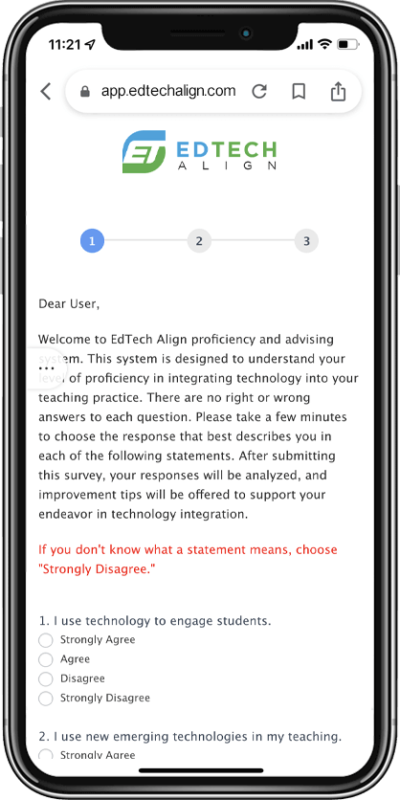
Measure Educational Technology Proficiencies!
This free tool shares a valid and reliable survey instrument for measuring educators’ edtech proficiency levels aligned to the ISTE, AECT, AACE, and Quality Matters professional standards and face-to-face, hybrid, and fully online modes of instruction.
Valid and reliable.
Accurate instrument was validated through empirical analysis and peer-review
Standards-aligned.
Aligned to four sets of professional educational technology standards: (a) ISTE Standards for Educators, (b) AECT Standards, (c) AACE Teacher Educator Technology Competencies, and (d) Quality Matters National Standards for Quality Online Learning
Applicable for all teaching modalities.
Fitted to three different teaching contexts: Face-to-face, hybrid, and fully online
When users take the EdTech Align survey instrument, they will be directed to a survey page, which is smartphone friendly, and contains 26 items. This survey is designed to evaluate educators’ proficiencies with edtech. Based on professional standards and multiple modes of teaching, five EdTech Align domains are used to analyze educators’ edtech competencies.
After completing the survey instrument, educators will be provided with a report based on their responses to the survey items. This report contains graphical information as well as curated edtech integration tips and professional growth strategies customized to each educator’s responses.
If you are an administrator and want to view your educators’ aggregated responses as a group profile, you can create an account with this system and generate a survey link specifically for your institution. With EdTech Align, you will gain a deep understanding of your group’s edtech strengths and weaknesses and ideas for focusing your institution’s professional development initiatives.
There are several ways to use EdTech Align for accreditation data reporting, teaching, and advising.
Group Profile for The Instructor
If you are an administrator and want to view your educators’ aggregated responses as a group profile, you can create an account with this system and generate a survey link specifically for your institution. With EdTech Align, you will gain a deep understanding of your group’s edtech strengths and weaknesses and ideas for focusing your institution’s professional development initiatives.
EdTech Align
Who We Are
EdTech Align is led by a group of researchers who are dedicated to assisting in-service and preservice teachers with integrating edtech into their instruction. The team members consist of experts in edtech integration that have real-world teaching experience. This project was initiated in 2018 when the research team was preparing for an accreditation visit for their college of education. The team searched for valid and reliable instruments with which to measure edtech competencies, aligned to professional edtech standards. However, the few empirically validated instruments that did exist were considerably limited by their generalizability, currency, and known reliabilities.
Dr. Fegely presented this gap in the literature to Dr. Lee as an opportunity to create such an instrument to share with the edtech field and education community. With the support and direction of Dr. Winslow, the research team embarked on a rigorous, multi-year process to create a valid and reliable instrument for measuring edtech competencies aligned to the ISTE, AECT, AACE, and National Standards for Quality Online Teaching professional edtech standards. The rationale for the team adopting this purposeful approach was threefold: (1) to mitigate concerns about the validity of a single set of standards, (2) to increase the instrument’s overall generalizability for different educational institutions, and (3) to accommodate online and hybrid instructional modalities in a post-pandemic world.
The research team filtered 33 organizational construction and 141 indicator statements from the four prominent sets of professional edtech standards to saturation, revealing five categories: (1) CREATIVITY, (2) CITIZENSHIP, (3) DIGITAL LITERACY, (4) PEDAGOGY, and (5) LEADERSHIP. The research team revised the statements within the categories for content validity through constructive response and cognitive interview feedback. Four phases of Rasch empirical analysis and four populations of in-service teachers were then used to examine the validity and reliability of the instrument and to inform revisions. At every step, the team’s progress was documented and disseminated to the education community through refereed international presentations and peer-reviewed publications. The result was an instrument with evidence of validity and reliability that is shared here.







